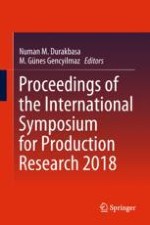2019 | OriginalPaper | Buchkapitel
Technology Selection for Digital Transformation: A Mixed Decision Making Model of AHP and QFD
verfasst von : Hasan Erbay, Nihan Yıldırım
Erschienen in: Proceedings of the International Symposium for Production Research 2018
Aktivieren Sie unsere intelligente Suche, um passende Fachinhalte oder Patente zu finden.
Wählen Sie Textabschnitte aus um mit Künstlicher Intelligenz passenden Patente zu finden. powered by
Markieren Sie Textabschnitte, um KI-gestützt weitere passende Inhalte zu finden. powered by
